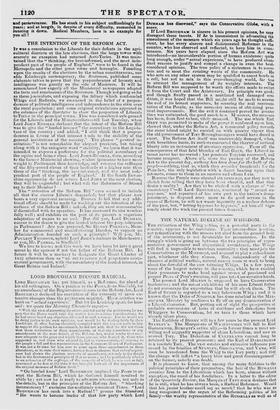LORD BROUGHAM BECOME RADICAL.
LORD BROUGHAM has put himself, as a Reformer, far ahead of his old colleagues. On a petition to the Peers, from Sheilield, for an amendment of the Registration-clauses in the Reform Act, Lord BROUGHAM declared his conviction of the necessity of more ex- tensive changes than the petitioners required. His conviction was built on "actual eaperience.- But let his Lordship speak for him- self: we quote the Morning. Chronicle report— With the view of correcting the errors pointed out by the petitioners, he was sure that the House would take the matter icto irs s,:rious consideration ; for Ire had never heard any objection adc,r.ced to such a course. taut he would not be doing justice to his own opinions, nor would he b,± dealing fairly by their Lordships. if, after having cheerfully complied with the teyvest made to bin, to support the petition fur amendmect, be did not add, that he did not think that those corrections or those amendments, or that any corrections or any amendments in the mere details of the Ilefgin Act, wou:d render that nun, sure adequate to the great end which those per•uns who frin:ed it, those who supported it, and those who adopted it, bad in view—namely, of •ecoring to the people a full and free representation in the Commons llouse of Parliament. It was not a fit time for him now to enter upon those amendments or those alterations, or to state their extent, further than to observe flirt actual experi • ence bad shown the absolute necessity of amendment, not only in tire details but in the fundamental principles of that measure ; and he particularly alluded to an extension one suirrove, of the rices,ity of ‘vIiirh he was row as fully eonvinced as he was at tl:e time it was bens slit furw::rd of the importance of the original measure of Reform itself."
"On bended knee" Lord BROUGHAM implored the Peers to ac- cept the Reform Bill, which he declared himself resolved to abide by ; yet now he is ready to advocate alterations, not only in the details, but in the principles of the Reform Act. " Shocking inconsistency. !" exclaims the uniformly consistent Times. "Lord BROUGHAM has sunk into a Radical !*' groans the Standard. "He wants to become leader of that low party which Lord DURHAM has disowned," says the Conservative Globe, with a sneer.
If Lord BROUGHAM is sincere in his present opinions, be may disregard these taunts. If he is inconsistent in advocating the amendment of the measure which six years ago he thought suffi- cient, he has every sincere and disinterested Reformer in the country, who has observed and reflected, to keep him in court- tenance. Six years have elapsed since the Reform Act was introduced—no inconsiderable portion of human existence; quite long enough, under "actual experience," to have produced abut'. dant reasons to justify and compel a change in even the best- considered opinions. The true policy of a statesman is to ascer- tain and to meet the existing wants of the community. He who acts on any other system may be qualified to count heads in a cell, but not to mix in this ever-changing world, far less to attempt the management of its weighty interests. The Reform Bill was supposed to be worth the efforts made to extort it from the Court and the Aristocracy. Its principle was good; and though finally passed in a mutilated and damaged con- dition, it was hoped that the Bill mie;ht still be made to answer the end of its honest supporters, by securing the real represen- tation of the People, as the necessary means of obtaining prac- tical improvements. But the evil it contained proved far greater than was anticipated, the good much less. Mereover, the measure has been, from first to last, vilely misused. The use which Earl GREY was permitted to make of the power it conferred upon him, showed that, under the Reform Act, a tyrannical policy towards the sister island might be carried on with greater vigour than the old government of Tory Boroughtnongers would have dared to exert. The Reform Act itself was irretrievably damaged, when, with breathless haste, its authors converted the charter of national liberty into an instrument of atrocious oppression. From all the consequences of that fatal blunder of Earl Grim the Liberal in- terest never has recovered : but prostrate Toryism recovered, and became rampant. Above all, since the passing of the Reform Act to the present day, nothing has been done for the bulk of the people—nothing, that is, which they consider beneficial; for the Poor-law, the only legislation with a direct bearing upon their interests, comes to them in an austere and odious firm.
Because the People were cheated six years ago, are they now to shrink from telling that they have been cheated, and that they desire a reality ? Are they to be choked with a charge of "in- consistency ?"—If Lord BROUGHAM, convinced by " actual ex- perience:* and repentant of his own part in the nation's disap- pointment, is disposed once more to do good service in the cause of Reform, he will not waste ingenuity in a useless defence of the past, but, " letting bygones be bygones," set himself vigo- rously about the work the present times demand.


























 Previous page
Previous page